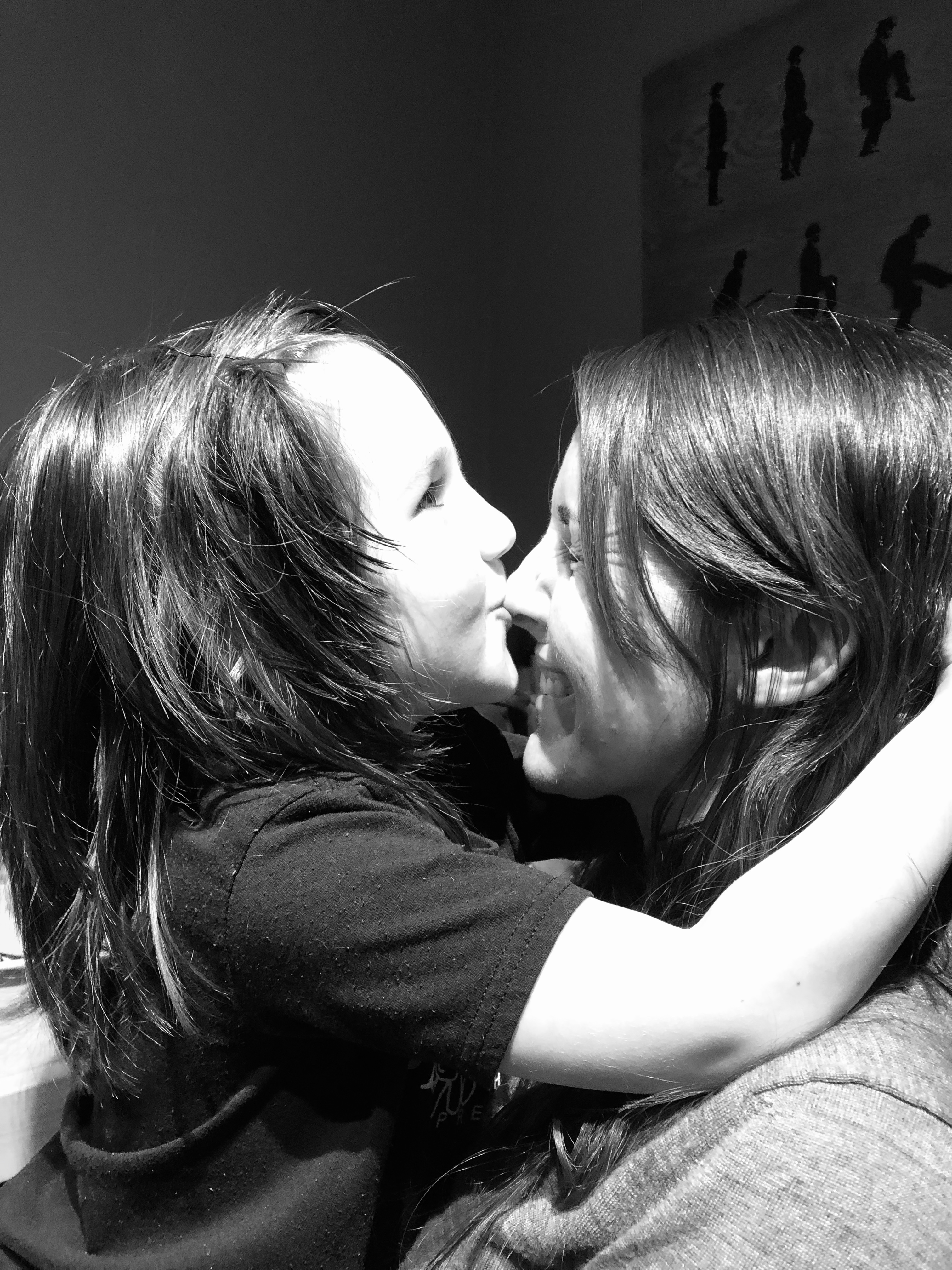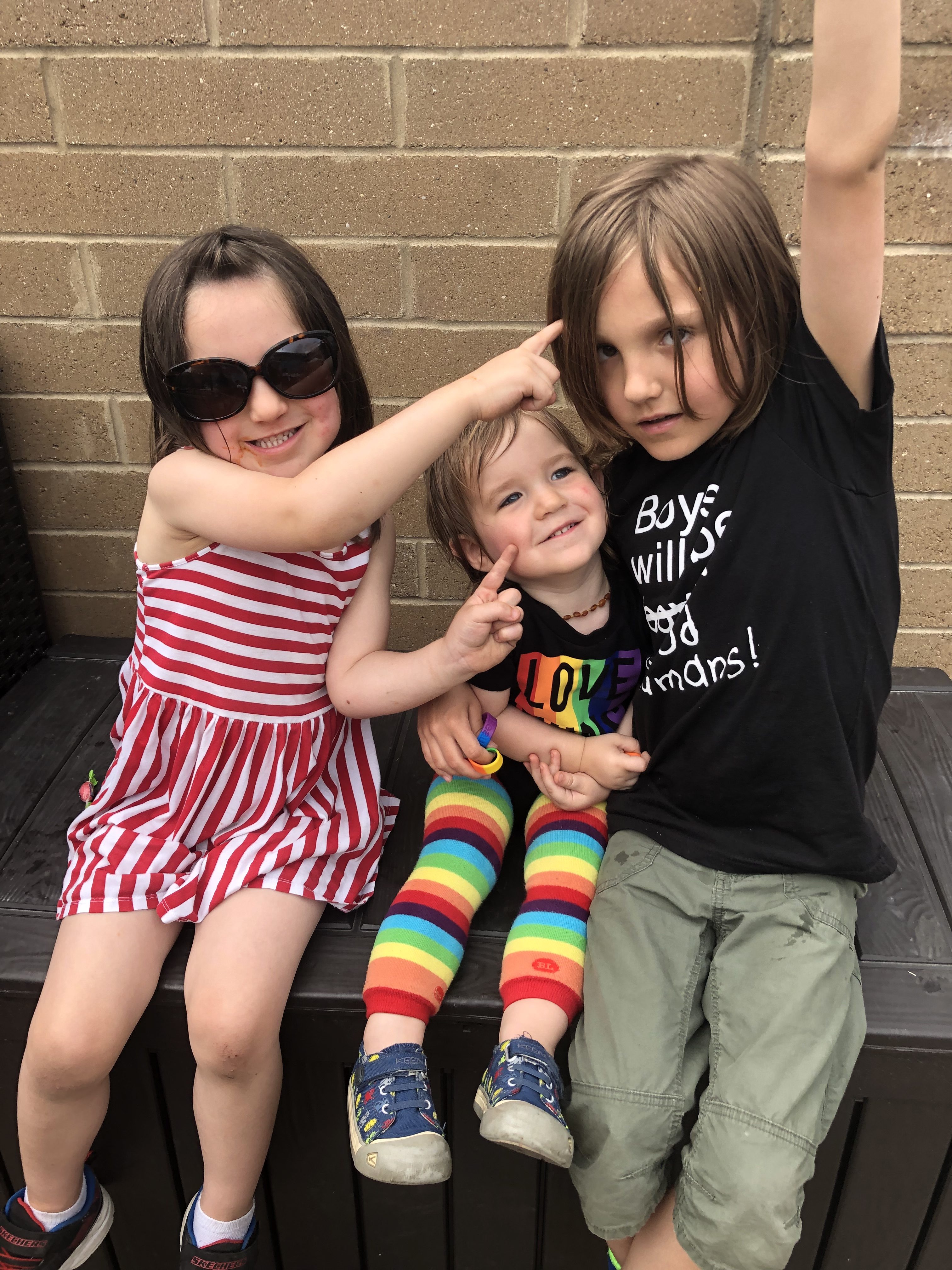I consider myself fortunate to have been raised to play alongside my younger brother. We both had Micro Machines and My Little Ponies. We loved playing in the muddy clay of my aunt and uncle’s field. We decorated our dollhouse together. We shared a love of Teenage Mutant Ninja Turtles. Before the end of elementary school, I had sketched my own female additions to the turtle team: Cassatt and O’Keeffe. As a child, I had an emerging awareness of gender differences in toys. Parenthood has expanded this awareness far beyond that of toys. Now, as a parent to three boys, gendered comments strike a chord with me daily. Despite my tendency to listen more than talk, I find my voice to speak up against gender stereotypes.
Although I have three boys, I’m not keen on the “boy mom” label. It so often brings with it a connotation of the stereotypical boy. I am a mum of boys, absolutely, but that’s a subtly different phrase. My boys are as much sugar and spice and everything nice as they are slugs and snails and puppy-dogs’ tails. They’re children.
These children of mine had haircuts recently. This was routine for Big and Little, and yet momentous for Middle– and for my husband and me. You see, until a few days ago, Middle had fantastically long, thick hair that fell well below his shoulders. He would frequently get mistaken for a girl, and he had no problem correcting innocent pronoun errors with a confident, “I’m a BOY with long hair.”
Last spring at Big’s seventh birthday party, a fellow parent mused aloud to me, “Your boys all have long hair.” Big’s hair has a surfer look to it. At that point, Little still hadn’t had his first haircut and was sporting the mullet-esque look of a half-grown toddler. And Middle, well, he had those long, thick locks. The parent went on to say, “Isn’t it hard to take care of?” What struck me was that I was the only parent to whom the question was directed, despite two of the other guests having long hair. The difference? The other two guests were first grade girls. I imagine that their hair is potentially just as prone to tangles as my boys’ hair. I know this from my own childhood experience as a long-haired girl who would sit in agony for post-hair wash combing. Tangles were inevitable despite the two braids my mum neatly plaited for me each morning before school.
Middle liked his hair long. He likes it short, too. He likes dinosaurs and dolls. He likes suspenders, neckties, and dresses. He’s his own beautiful, unique self. He’s had long hair cut short before. The difference this time is that maintaining long hair was completely his choice. Cutting it was more mine than his although he did ultimately agree. It was a difficult decision made purely because Middle would not stop putting the ends of his hair in his mouth.
The constant chewing transformed his smooth brown locks into a stiff, congealed mess. We tried bobby pins and ponytails, but the front hairs would sneak out of place and find their way back into his mouth. I gave him gum as a last resort one day, trying to occupy his mouth with an alternative. That particular day consequently found him in the bath by mid-morning while I worked coconut oil into the strands of hair that had rendezvoused with the gum in his mouth. Post-cut, his hair is still on the long side. If he chooses to wear one of his dresses, strangers will undoubtedly mistake him for a girl. He’s OK with that, as am I. After all, it wasn’t too long ago that society ridiculed women for wearing trousers.
This summer, my husband’s friend asked him if we’re raising our children to be gender neutral. We’re not. They identify as boys. What we are doing, however, is letting each explore his own identity however he may choose. This may mean that Middle wants to wear a dress to school one day but shorts with suspenders the next. It may mean that he dons his Wonder Woman swimsuit in the paddling pool one day but fluorescent green swim trunks the next. It means that my husband and I are raising our kids to be kids. And one day, these kids will hopefully grow into good humans with confidence in themselves and empathy for others.
We’re having conversations with our boys, dispelling the implicit and explicit lessons they learn regularly from the gendered comments that escape people’s mouths without a second thought. Middle takes great pride in joining us in dispelling these lessons. One of our favorite books is Christine Baldacchino’s Morris Micklewhite and the Tangerine Dress, a sweet story about a little boy who loves to wear the tangerine dress in his classroom dress up area. The book concludes with one of Morris’s classmates declaring, “Boys don’t wear dresses.” With confidence that has grown throughout the book, Morris retorts, “This boy does.”
My Middle, now five, chose to wear his dress to school on the last day of three-year-old preschool in part because he wanted someone to tell him that boys don’t wear dresses. He’d been involved in conversations with fellow preschoolers around the classroom’s dramatic play area. At three and four, some of Middle’s classmates were adamant that he couldn’t choose a princess dress to wear. On the last day of school, he delighted in replying, “This boy does.” A year later, when he wore his dress to school again, he arrived home visibly disappointed that no one had commented. His disappointment was beautiful, both for the passion he felt and for the fact that his peers had grown in their inclusivity.
Pushing back against gender stereotypes sometimes– often– feels like an uphill struggle. Sometimes, it’s exhausting. Sometimes, it seems like giving in would be easier. But then I think of the role I have to raise good humans and the honor I have to contribute something to this world. I think of my sons, each of whom my husband and I encourage to try on different identities along their individual journeys to find themselves. And do you know who wants to keep trying? This mama does.
The thing about hair is that it will always regrow. Perhaps by the time the front strands reach his mouth again, Middle will have outgrown his need to chew. Or perhaps he’ll decide that he prefers shorter hair. I miss his long hair because it was such a distinctive feature. I miss his long hair because it led to important external conversations and internal realizations– for me, for him, and for those with whom we interacted. As his hair grew, so did we. Long hair or not, we’ll continue to have those important conversations as a family. We’ll continue to grow.












